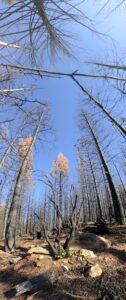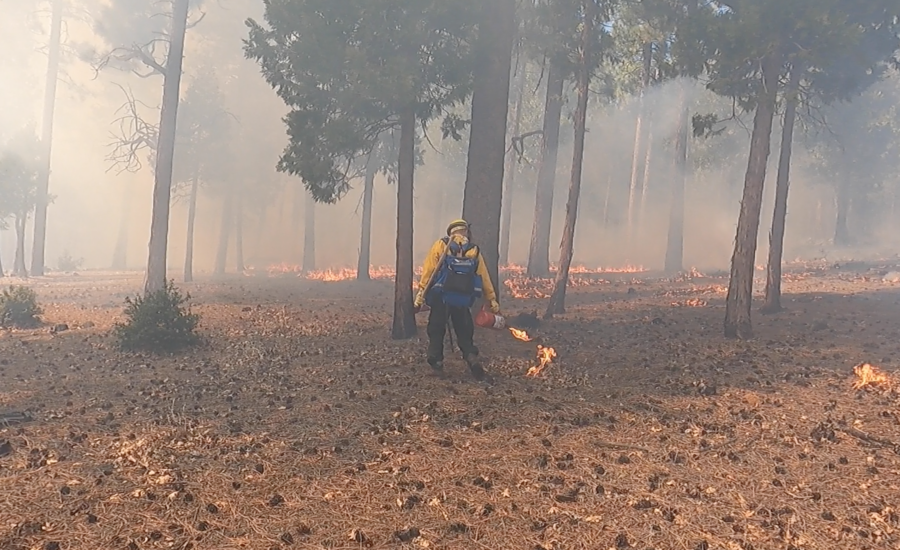Recently, I taught nature journaling at a prescribed fire training program in Quincy California. The North Complex fire, one of the biggest wildfires of the 2020 season, hit this area hard. In part due to this they are trying to get good fire on the ground in Plumas County. In fact, prescribed burns are the only practical way to prevent future catastrophic fires.
I will give some background on prescribed fire and show you how nature journaling can help. A lot went into making this: preparing the workshop, nature journaling and filming in extreme conditions, and hours of editing but I am really passionate about sharing this information with you.
Before the fire…
I knew I would be working with a different audience when I was invited to teach at the Plumas Cal-TREX. My goal was to share a valuable tool with this audience. That’s because I firmly believe that nature journaling is more than just a relaxing hobby that helps people connect with nature. In fact, nature journaling is a powerful tool that can help people in many fields including fire-fighters, fire scientists, land owners, and foresters. It can improve observation, communicate ideas, and help make novel connections. This would be an opportunity for me to prove the practical application of nature journaling. We need to get nature journaling into the hands of more people. We need to apply nature journaling to more critical fields.
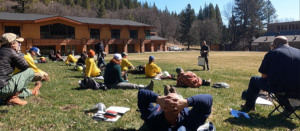
Some Background…
TREX is the prescribed burn training exchange program of the Nature Conservancy. These exchanges were started to deal with the shortage of trained people. Prescribed fire is the easiest and most cost effective way of reducing excess fuels. Excess fuels are one of the main causes of the catastrophic fires we have been seeing. However, there are not enough trained people. Therefore we need TREX. So far I have nature journaled at two TREX live fires.
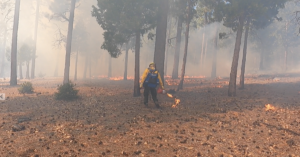
Plumas County Fire Safe Council put on the specific TREX event that I taught at. The goal of the council is to prevent loss of human and natural resources caused by fires. One way to do this is to use prescribed burns for reducing fuel. 
The Mountain Maidu are the main indigenous people residing in the Plumas County area. They historically used fire to manage the landscape ecology and select for ethnobotanical resources. Most of California was managed with fire by indigenous populations and was essential for their food production and other resources. The suppression of fire by European Americans was a direct attack on indigenous livelihoods. Efforts to bring back prescribed fire and cultural burning in California is often be spearheaded by California Native groups. One example is the Eco-Cultural Revitalization program of the Karuk Tribe
Recent Fires in the Area
The North Complex Fire started on August 17th 2020 and grew to a perimeter of 318,935 acres before being contained completely on December 3rd. The fire moved through the Plumas National Forest in Plumas County and Butte County.
In addition the devastating North Complex Fire, the Camp Fire burned through neighboring Butte County in 2018. This is the fire that devastated the town of Paradise California in November of 2018. It covered and area of 153,336 acres and destroyed more buildings and killed more people that the North Complex Fire. The drought in California was one factor that allowed for this fire. Normally the area would have received more rain by this late time in the year. I drove through some of the burn scar from this fire on my way to the Plumas TREX. I was also able to nature journal near Lake Concow in May and see the fire regrowth there.
Another Reason to Nature Journal Prescribed Fire
You might be asking yourself this question.
“Hey Marley! How does this kind of extreme nature journaling during a fire apply to me?”
That would be a good question. Some of you might live somewhere in which fire is not a big part of the local ecology. You might not be as mobile as I am or even have the access that I do. For this reason I like to bring it back to the average nature journaler. With this in mind I test techniques and supplies in extreme conditions. What I have found is that the things that work under duress will be easier to use in the average situation. This principle helps me recommend better techniques and supplies.
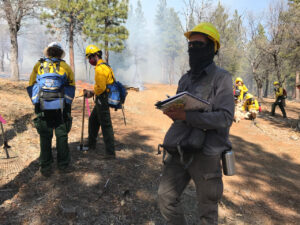
For example, my main drawing tool worked great during the prescribed fire and is my favorite nature journaling tool. The gray and black ink allowed me to draw smoke, make 
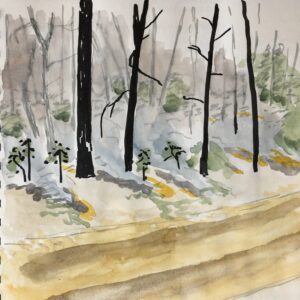
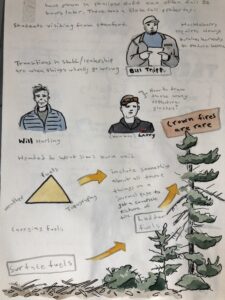
So obviously the Pilot Futayaku Brush Pen is a good choice but what about choosing other art and nature supplies? In that case check out Nature Journaling Supplies: What You Need and What You Do Not
Post-Fire Nature Journaling Workshops with Laurie Wigham
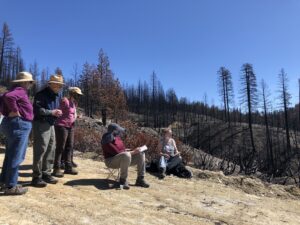
In addition to teaching nature journaling to the prescribed fire participants there was also a community art workshop led by Laurie Wigham. Laurie is an experienced urban sketcher and nature journaler. She taught workshop attendees how to observe degrees of burn severity and also how to use twigs dipped in ink for drawing. This was a free workshop for the local community of Quincy California and was sponsored by the Plumas Fire Safe Council. As I assisted Laurie I soon realized with the therapeutic role that nature journaling could play for people who had traumatic experiences with fire. Recently, Miriam Morrill, John Muir Laws, and Scott Amick organized a mini conference on the potential for combining nature journaling with a trauma-informed therapy approach for communities affected by fire. You can see the sessions on youtube here.
Are you new to nature journaling? If so, then this post has the basics : How to Nature Journal in 10 Steps
